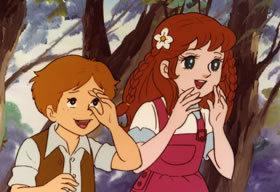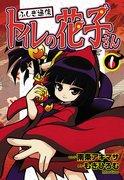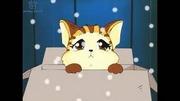Charlotte of the Young Grass: A Thorough Analysis of the Moving Story and Character Appeal

Charlotte of the Young Grass: A Girl's Growth and Troublesome Story■Overview of the work"Charlotte of the Young Grass" is an original anime series produced by Nippon Animation that aired on TV Asahi from October 29, 1977 to May 27, 1978. It has 30 episodes and airs every Saturday from 7:00 p.m. for 30 minutes, depicting the growth and turbulent life of a young girl named Charlotte. It was directed by Eiji Okabe and produced by Nippon Animation and Asahi Broadcasting Corporation, with production cooperation from Trans Arts. ■ StoryCharlotte is a tomboyish beauty who lives with her father Andre on a farm in Canada. On her 12th birthday, she learns that her mother Simone, who she had been told had died of an illness, is still alive. This fateful moment marks the start of a series of hardships for Charlotte. The impressionable girl faces turbulent days, including the accidental death of Andre, the sinister plans of adults over the rights to the farm, and a reunion with her biological mother Simone, but she grows strong thanks to the support of kind-hearted people. ■Explanation"Charlotte of the Young Grass" is an original work created by Nippon Animation. Although the setting is a masterpiece, the characters and story development have some strong elements of girls' manga. For a girls' anime from the 1970s, it is characterized by a moving story and beautiful background art, deeply moving viewers. It also includes themes that reflect the social background of the time, depicting universal themes such as family love, friendship, and growth. ■Cast・Charlotte/Keiko Yokozawa・Mylene/Kazuko Yanagi・Marquis/Kohei Miyauchi・Andre/Ichiro Murakoshi・Melville/Ichiro Nagai・Sunday/Yoshito Yasuhara・Sonia/Kaoru Kurosu・Sammy/Kazue Komiya・Simone/Akiko Tsuboi・Gorton/Yasuo Muramatsu・Night/Rokuro Naya・Narrator/Akiko Tsuboi ■ Main staff・Producer / Koichi Motohashi・Planning / Nippon Animation・Production management / Mitsuru Takakuwa・Planning / Shoji Sato・Music / Hiromasa Suzuki・Direction / Eiji Okabe・Producer / Akira Negoro・Screenplay / Shunichi Yukimuro・Character design / Shinya Takahashi・Animation directors / Nobuyuki Kitajima, Tetsuo Shibuya, Sadayoshi Tominaga, Kazuo Nozawa, Toji Mizumura・Scene setting / Kazusuke Yoshihara・Art director / Kazusuke Yoshihara・Director of photography / Tetsuro Kumase, Toru Hagiwara・Sound recording director / Sadayoshi Fujino・Color design / Toshio Suzuki, Akihiko Isozaki, Keiko Takahashi, Akemi Ito・Animation / Ad Cosmo, Mariko Iioka, Tetsuo Shibuya, Yoshitaka Ushirogami, Jin Saga, Hiroki Sugawara, P Productions, Kaoru Harada, Fumio Masubuch, Shinji Otsuka, Katsuhiko Yamazaki, Yoshiyuki Kishi, Satoshi Yamaguchi, Satoshi Umimura Midori, Kumi Omori, Sanae Iida, Mariko Kamikane and others・Storyboards / Eiji Okabe, Hiroshi Yoshida, Masaru Sasagi, Santa Uwa, Koutatsuma and others・Finishing touches / Studio Robin・Backgrounds / Studio Uni, Ichiro Sugiura, Miniart, Yuko Tahara, Kazue Takei, Kiyoshi Kato, Hiroji Tani and others・Cinematography / Trans Arts・Sound production / Omnibus・Promotion・Mixer / Kunio Kuwabara・Sound effects / Ishida Sound・Sound recording studio / Cinebeam・Development lab / Tokyo Developing Lab・Titles / Akira Michikawa・Editing / Koike Kofu, Hidetoshi Kamitono・Director in charge / Eiji Okabe・Assistant director / Yukio Okazaki, Tetsuro Kumase・Production desk / Susumu Ohara・Production assistant / Yoshihide Kuriyama, Renji Kawabata・Production / Nippon Animation Asahi Broadcasting・Production cooperation / Trans Arts ■Subtitle・01/Birthday Event (1977/10/29) ■ Related works・Her Majesty's Petit Ange (a Japanese anime original about girls) ■ Theme songs and music・OP ■Detailed review"Charlotte of the Young Grass" is a work that can be said to be a monumental work of girls' anime. The story of the protagonist Charlotte's growth deeply moved viewers and captured the hearts of many people. Below, we will explain in detail the appeal and features of the work. 1. The appeal of the storyThe story of "Charlotte of the Wild West" centers around the growth of a young girl and her love for her family. The process in which Charlotte learns that her mother Simone is still alive and tries to reunite with her evokes strong empathy in viewers. In addition, the turbulent events, such as the death of her father Andre in an accident and the battle over the rights to the ranch, have the power to draw viewers in. In particular, the way Charlotte overcomes difficulties and grows has given courage to many viewers. 2. Character design and directionThe character designs are by Shinya Takahashi, and are characterized by their combination of cuteness and realism reminiscent of shojo manga. Charlotte's facial expressions and movements in particular express her emotions realistically, leaving a deep impression on the viewer. Eiji Okabe's direction also effectively portrays moving scenes, moving the viewer's heart. The background art is also beautiful, with realistic depictions of the Canadian nature and the streets of Paris. 3. MusicThe music was composed by Hiromasa Suzuki, and the opening theme "Charlotte of the Young Grass" and the ending theme "Mayflower" left a deep impression on viewers. The opening theme "Charlotte of the Young Grass" in particular, combined with Kaori Kumiko's singing voice, is a beautiful melody that symbolizes the theme of the work. The music in the play is also used effectively in line with the development of the story, enhancing the emotions of the viewers. 4. Social Background and ThemesThe film includes themes that reflect Japanese society in the 1970s, and portrays universal themes such as family love, friendship, and growth. In particular, the process in which Charlotte tries to reunite with her mother, Simone, deeply moved viewers at the time. It also depicts social issues such as the battle over ranch rights and Andre's accidental death, providing viewers with elements to think about. ■Reasons for recommendation"Charlotte of the Young Grass" is a work that can be said to be a monumental achievement in girls' anime, and has touched many viewers. In particular, the story of Charlotte's growth and the love of her family resonate deeply with viewers. In addition, the character design, direction, and music are also excellent, drawing viewers in. It also contains themes that reflect the social background of the 1970s, and has elements that will make viewers think. We recommend that you give it a watch. |
>>: Review of "Gekisou! Ruben Kaiser - Speed and Passion"
Recommend
Resident Evil: Welcome to Raccoon City first trailer released tomorrow
The first trailer for Constantin Film's reboo...
Netflix's "The Witcher" uses less CGI technology to make the scene expression closer to reality
In the Netflix version of The Witcher TV series, ...
Henry Cavill will return to play Superman in Shazam 2, foreign media denies it
Recently, there have been rumors that Henry Cavil...
"Guardians of the Galaxy 3" is saved! Original director James Gunn returns
Last summer, James Gunn, the director of Guardian...
Rainbow Six live-action movie to be directed by John Wick director
John Wick director Chad Stahelski has been confir...
The appeal and reviews of Natsuiro Kiseki: A moving story and character depth
All-round review and recommendation of Natsuiro K...
Korean girl Cos "Rozen Maiden" Mercury Lamp Beauty Picture Lonely Beauty Sweet Appearance
In the Japanese manga "Rozen Maiden", M...
The new trailer of "Bone Knight's Adventure in Another World" confirms that it will be broadcast in April
The official TV animation adapted from the popula...
"She-Hulk" was suddenly criticized online for discriminating against the homeless by blocking off benches in the trailer
The most popular Marvel drama in recent times is ...
"Fantastic Beasts 3" gets the green light and is expected to start filming in July
Many blockbusters such as "Fantastic Beasts ...
The appeal and evaluation of "Asobi Asobase": New possibilities for comedy anime
"Asobi Asobase": The best junior high s...
The Hidden Dungeon Only I Can Enter - The Appeal and Evaluation of Exclusive Dungeon
"The Hidden Dungeon Only I Can Enter": ...
Detailed review and rating of Dr.STONE -NEW WORLD- Season 3, 1st cour
Dr.STONE -NEW WORLD- Season 3/First Cool Review a...
The reputation of the animation "The Three-Body Problem" collapsed and was mocked by the audience. The Douban score dropped below 6 points
After the animation of "The Three-Body Probl...
Marvel reveals that Daredevil's return to the movie will choose the TV version of the lead actor
After months of rumors and speculation, Marvel bo...









